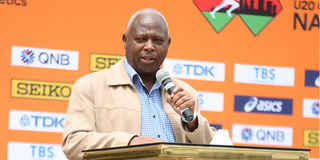Why Kenya's bid to host 2025 World Championships looks promising

Athletics Kenya President Jack Tuwei speaks to the media ahead of World Under 20 Championships at the Moi International Sports Centre, Kasarani in Nairobi, on August 17, 2021.
What you need to know:
- Athletics Kenya president Jack Tuwei disclosed that good infrastructure that include transport system and training venues are some of the key factors that World Athletics Council will explore before awarding the rights
- Tuwei noted that besides the main arena of the event, the bidding countries are required to have more than two venues with international standard track for athletes to train
- Tuwei said the six-lane track at Kenyatta University that is part of the World Under-18 and Under-20 legacy, has also been factored adding that the track at Kasarani will be overhauled if necessary
The ongoing construction of the Expressway and the Jamhuri Sports Complex are some of the key factors Kenya has used in their effort to win the bid to host the 2025 World Athletics Championships.
Athletics Kenya president Jack Tuwei disclosed that good infrastructure that include transport system and training venues are some of the key factors that World Athletics Council will explore before awarding the rights.
“Traffic in Nairobi has always been a major concern but the completion of the Expressway from Jomo Kenyatta International Airport through to Waiyaki Way will be key to our bid,” said Tuwei after Kenya officially presented its bid to host the world event to World Athletics on Friday last week.
Tuwei noted that besides the main arena of the event, the bidding countries are required to have more than two venues with international standard track for athletes to train.
Tuwei said that besides the Nyayo National Stadium, the completion of the Jamhuri Park Sports Complex along Ngong Road and the Kirigiti Stadium, Kiambu County is crucial for their bid.
“We want them built to the required international standards that include the modern tartan track with eight lanes,” said Tuwei. “These training venues or warm up tracks are needed closer to the main competition arena and the three are within the radius required.”
Tuwei said the six-lane track at Kenyatta University that is part of the World Under-18 and Under-20 legacy, has also been factored adding that the track at Kasarani will be overhauled if necessary.
The track was laid in 2017 and given a life span of between seven to 10 years.
Tuwei said that he is grateful to the government for successfully facilitating the staging of the World Athletics Under-18 Championships in 2017 and the World Under-20 Championships this year.
“With lessons learnt from these two world events, Kenya has built the capacity and is confident and ready to host the next event,” explained Tuwei after completing the second phase of the process by presenting the bid.
Tuwei said the event has never been to Africa hence time is ripe for the continent to have a share of the top athletics celebrations right in Nairobi.
Tuwei said Kenya’s bid will move to the third phase when the selection panel from World Athletics will visit the country early next year for an inspection before presenting its report to the World Athletics Council.
“The fourth and final phase is where the World Council will discuss all the bids and award the winning country,” said Tuwei, adding that the winners will be known before the 2022 World Championships due July 15 to 24 in Eugene, Oregon, United States.
“The first stage involved showing the interest and getting the government’s guarantee and clearance,” said Tuwei, adding that their bid went into details about the competition venue, warm up venue, road network, accommodation facilities, security, medical set-up among other things.
“We have engaged virtually all the ministries and key private sector partners in putting up a detailed and strong document,” said Tuwei.
Nigeria, Algeria, Egypt, Morocco, and South Africa are the countries that are also interested in hosting the event. The country that wins the bid will have to invest between $70million (Sh7 billion) and $80 million (Sh8 billion).
The money will be spent on logistics (33 percent), broadcast (19 percent), promotional strategy (9 percent), ticketing operations and hospitality (2 percent), medical and anti-doping (1 percent), prize money (12 percent), event management and presentation (4 percent), event planning (10 percent), additional events (3 percent) and other costs (6 percent).
A successful bid requires financial guarantee from the government.




